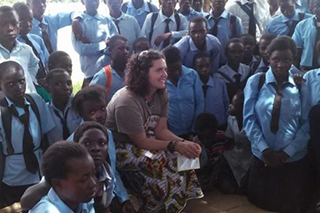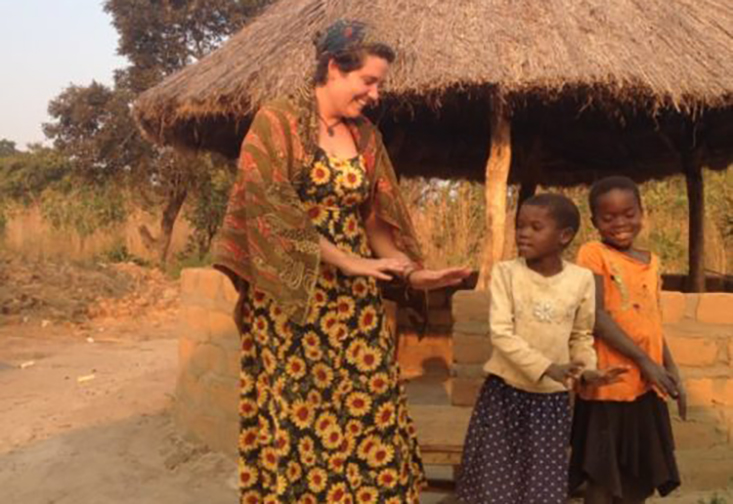Brandi Murphy always knew she wanted to join the Peace Corps. Part of it was wanderlust — a desire to see another part of the world. The other part was what she describes as the call to serve.
So during her junior year at USF St. Petersburg, the Lakeland native started the lengthy Peace Corps application process. Nine months later, she received the news that changed her life: in February of 2016, just over a month after graduating, Murphy would leave for a more than two-year posting in Zambia.
“I really wanted to be in Africa, and it was fantastic to have the opportunity to explore as much as I did,” the Environmental Science and Policy major explained. “The Peace Corps put me in there in a grassroots way with enough time to sustain the initiatives I had begun.”
Murphy spent her first three months in Zambia studying the Bemba language, local farming practices and ways to improve sustainability before moving to her new home in the country’s Central Province. Her mission was threefold: to train local farmers in more sustainable agricultural practices, to gain a deeper understanding of another culture to share back in the U.S. and to promote a better understanding of Americans to local residents.
“I was excited and ready and nervous and didn’t know what to do next, but I was received really well,” she explained.
Murphy lived in a simple mud brick home on a compound with a host family, who shared
meals, helped her navigate the new culture and donated a portion of their land so
that Murphy could demonstrate new farming practices. Her focus in her first few months,
however, was establishing relationships and integrating herself into the community.
Murphy would sit with local woman to shell peanuts or remove corn from the cob so
that it could be processed into maize. Nearly every day, she opened her home to nearby
children who were curious about the different-looking foreigner and the foods and
music she had brought from home.
“I always had kids in my home. They loved having dance parties. I would play Bob Dylan and Neil Young for them, or the harmonica my dad sent me,” Murphy said. “There was lots of cultural exchange. People wanted to talk about politics and life in the U.S. I got lots of questions about violence and income, entertainment and also myself. I also got a lot of practice explaining why I was there, because almost everyone asked.”
As a Peace Corps volunteer, Murphy walked a line between teaching and learning, between trying to impart knowledge she believed could improve local diets and efficiency while also learning from her neighbors — who knew more about their own needs (and farming) than she did.
“People have a great idea of what they want to see down the line,” she said. “I tried to help them get there.”
We recently sat down with Murphy to learn more about her experiences at USFSP and in Zambia.

Tell us a little about the everyday details of your life in Zambia.
I drew water from the local well to wash clothes and dishes and bathe. I ate meals
with my host family. We ate maize, made into a hard porridge as well as cassava and
sometimes peanuts. I spent time visiting with people, helping with communal work,
tending my garden and demonstrating new techniques, working in the fields. I obtained
seeds for trees and soybeans to help fix nitrogen in the soil and boost nutrition,
and demonstrated how to cultivate sunflowers and press their seeds for oil — in addition
to implementing HIV- and malaria-education programs. Days varied—there was a season
for everything.
You mentioned eating a lot of maize. Was there ever a special food you looked forward
to having?
Fried caterpillars. We’d fin them when the rains started. It was like eating crunchy
butter. Termites, not so good.
What was the hardest part of your experience?
I would say breaking down barriers and making connections. That’s something I constantly
worked on. It was invaluable. But also tiring. As a woman, I found myself pushing
back against traditional gender roles and trying to talk about ideas of equality.
I also had to prove my toughness. Eventually, men would ask me to work with them.
It was harder to break in with the women in some ways, probably because men spoke
more English. But women do all of the work.
What do you want to share about the people you came to know in Zambia?
People there are so happy, laughing and smiling all of the time. It was so nice to
be around happy people and to not be inundated with schedule demands or social media.
Living such a simple life helped me put my priorities in order. It shifted my perspective
and opened my eyes wider than I thought it would. The people I knew were kindhearted.
It was hard to leave. I didn’t know how to say goodbye.
You transferred here after starting at Florida State University. Why did you choose
USFSP?
I loved the size, and you can’t beat being in St. Petersburg. Smaller classes allowed
me to really interact with students and professors. And I got really involved in co-curricular
activities—like the Student Environmental Awareness Society, student government, the
Garden Club and sustainability movements on campus. I value a higher education. It’s
nice to be able to articulate your thoughts. And my background in science really helped
me understand the chemistry behind what I was trying to teach in Zambia.
What advice would you have for students interested in the Peace Corps?
Do it. You won’t regret it. You’ll regret not doing it. Two years goes by fast.
What’s next?
I’m hoping to start the Master of Arts program in Global Sustainability at USF Tampa
next fall.
To learn more about Murphy’s Peace Corps experience, check out her blog (http://sliceoflife41.blogspot.com/).
